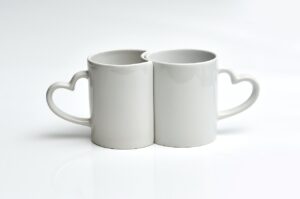
The pulse
Heart rate can be calculated by measuring the pulseThe pulse is the sensation of beating that one feels by applying slight pressure on an artery, usually at the wrist or neck. It corresponds to the blood flow pulsated by the heart through the arteries with. The 2 most frequently used pressure points for taking the pulseThe pulse is the sensation of beating that one feels by applying slight pressure on an artery, usually at the wrist or neck. It corresponds to the blood flow pulsated by the heart through the arteries with are in the neck (carotid artery) and on the wrist (radial artery).
In the neck
In the neck: apply gentle pressure with 2 fingers, the index, and middle fingers, on the artery on one side of the neck, near the thyroid cartilage, commonly known as “Adam’s apple”, in front of the underlying neck muscle. The pulseThe pulse is the sensation of beating that one feels by applying slight pressure on an artery, usually at the wrist or neck. It corresponds to the blood flow pulsated by the heart through the arteries with is felt under the fingers. The beats are counted for 10 seconds and multiplied by 6 to arrive at the number of beats per minute.
On the Wrist
On the wrist: use the same 2 fingers to press on the artery on the thumb side of the wrist. Locating the pulseThe pulse is the sensation of beating that one feels by applying slight pressure on an artery, usually at the wrist or neck. It corresponds to the blood flow pulsated by the heart through the arteries with at this site is often difficult, but after a little trial and error, it is manageable. A light pressure is applied at this point and the pulseThe pulse is the sensation of beating that one feels by applying slight pressure on an artery, usually at the wrist or neck. It corresponds to the blood flow pulsated by the heart through the arteries with calculation follows, as described for taking the pulseThe pulse is the sensation of beating that one feels by applying slight pressure on an artery, usually at the wrist or neck. It corresponds to the blood flow pulsated by the heart through the arteries with through the neck artery.
An important piece of information
The regularity of the beats is also very important. Every additional detail provides the doctor with valuable clues to take into account when making a diagnosis.
The Arrhythmia Problems section is dedicated to heartbeat irregularities, frequencies that are too low or too high, and how to treat them: medication, pacemaker, defibrillator, and more.











